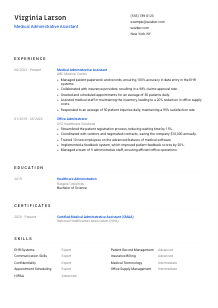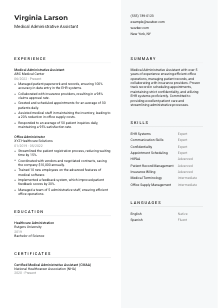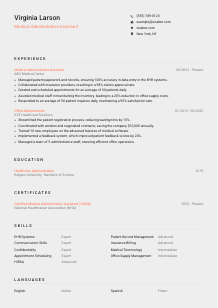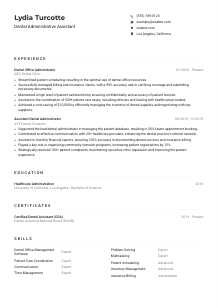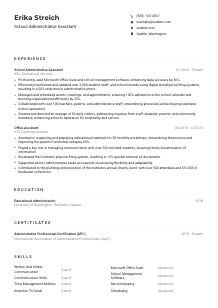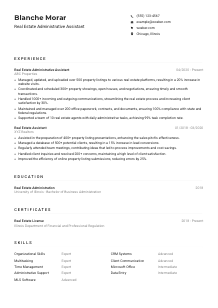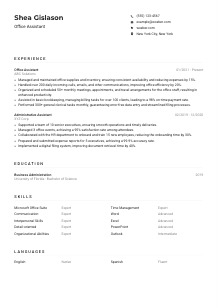Medical Administrative Assistant Resume Example
Juggling patient charts but stumped by your resume? Check out this Medical Administrative Assistant resume example, drafted with Wozber free resume builder. Discover how you can seamlessly blend your health office expertise with job specifics, ensuring career health as robust as patient files!
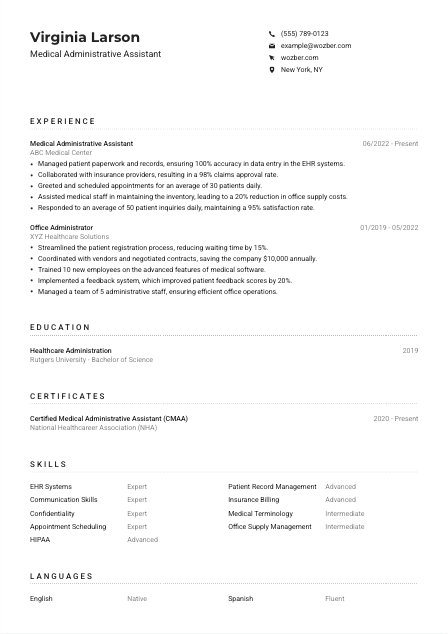
How to write a Medical Administrative Assistant Resume?
Hello, aspiring Medical Administrative Assistant! If you're eager to step into a role that's vital to any medical office, your resume needs to not only speak volumes about your administrative prowess but also pass through the discerning eyes of an Applicant Tracking System (ATS). Leveraging the power of Wozber, a free resume builder designed for precision and effectiveness, this guide will walk you through creating a resume tailored perfectly for a Medical Administrative Assistant position. With a focus on ATS-compliant resumes, let's craft a document that aligns your skills and experiences with your dream job's requirements.
Ready to secure your place in a rewarding career? Let's dive in!
Personal Details
First impressions count, especially on paper. The Personal Details section of your resume is the doorway to your professional world. Let's tailor this section specifically for the Medical Administrative Assistant role, ensuring every detail contributes to a compelling introduction.
1. Brand Yourself with Your Name
Start with a clear presentation of your name. Think of it as the title of your professional story. Ensure it's the most noticeable text on the page, using a clean, professional font. This sets the stage for your candidacy.
2. Directly Align with Your Desired Role
"Medical Administrative Assistant" should not just be a desired position but a part of your identity on the resume. Placing this title beneath your name instantly aligns you with the role, showing compatibility at first glance.
3. Essential Contact Information
Accuracy is key. Include your phone number and a professional email address (think firstname.lastname@email.com). This detail shows you're ready for professional engagements and easily reachable.
4. Location Matters
Since the job specifies New York, NY, make sure to highlight this in your contact details. It tells your potential employer you're right where they need you, eliminating any concerns about relocation.
5. Online Presence
Including a professional profile or personal website can provide a broader view of your professional journey. Ensure any linked profiles are current and mirror your resume's professionalism.
Takeaway
Your Personal Details section is more than just an introduction; it's your first pitch. Ensuring it's professional, aligned with the role, and inclusive of essential details sets the tone for everything that follows. Begin with precision, and you're on your way to making a memorable first impression.





Experience
Within the bustling environments of medical offices, your administrative skills are the glue that holds everything together. It's time to shine a spotlight on your experience in a way that precisely matches the needs of a Medical Administrative Assistant position.
- Managed patient paperwork and records, ensuring 100% accuracy in data entry in the EHR systems.
- Collaborated with insurance providers, resulting in a 98% claims approval rate.
- Greeted and scheduled appointments for an average of 30 patients daily.
- Assisted medical staff in maintaining the inventory, leading to a 20% reduction in office supply costs.
- Responded to an average of 50 patient inquiries daily, maintaining a 95% satisfaction rate.
- Streamlined the patient registration process, reducing waiting time by 15%.
- Coordinated with vendors and negotiated contracts, saving the company $10,000 annually.
- Trained 10 new employees on the advanced features of medical software.
- Implemented a feedback system, which improved patient feedback scores by 20%.
- Managed a team of 5 administrative staff, ensuring efficient office operations.
1. Decode the Job Listing
Start with a thorough analysis of the job requirements. Highlight phrases like "ensuring accurate billing" or "managing patient paperwork." These are your keywords to weave into your experience section, demonstrating direct relevance.
2. Present Your Professional Narrative
Arrange your experiences in a reverse chronological order. Clearly state your job title, the name of your employer, and your tenure. This structure provides a clear, logical narrative of your professional growth.
3. Detail Your Achievements
Use bullet points to list your tasks and accomplishments. For instance, "Managed patient paperwork and records, ensuring 100% accuracy in data entry in the EHR systems" directly reflects the job's demands, showing you're a perfect fit.
4. Quantify Your Impact
Employers love numbers. They provide a tangible measure of your contributions. Mentioning, for example, that you \
5. Relevance is Key
Keep your content focused on the Medical Administrative Assistant role. Avoid generic office skills, concentrating instead on specifics like EHR systems and medical billing proficiency, making it impossible for hiring managers to overlook your suitability.
Takeaway
Your experience section is your opportunity to demonstrate your compatibility with the Medical Administrative Assistant role. By aligning your accomplishments with the job's demands, you make a compelling case for why you're the ideal candidate. Remember, specificity is your ally.
Education
While specific educational paths are diverse, highlighting the right credentials and relevant courses can substantially boost your resume. Let's tailor your Education section to underscore your readiness for a Medical Administrative Assistant position.
1. Identify Essential Education
Even if the job doesn't stipulate specific educational qualifications, listing your degree shows a foundational knowledge base. For example, a Bachelor of Science in Healthcare Administration speaks volumes about your preparedness for the role.
2. Structure for Clarity
Maintain a simple format: name your degree, your field of study, and the institution's name, followed by your graduation year. This clarity ensures your qualifications are easily understood at a glance.
3. Detailing Your Degree
If your degree directly pertains to your job application, spotlight it. For roles like Medical Administrative Assistant, a relevant field of study showcases a targeted educational background.
4. Relevant Courses and Certifications
Highlight specific courses or certifications only if they add value to your application. In this scenario, a certification as a Medical Administrative Assistant (CMAA), if you have it, would be a gold star on your resume.
5. Additional Academic Achievements
Mentioning honors or relevant extracurriculars can bolster your application, especially if you're early in your career. These details suggest a well-rounded candidate with a commitment to growth and excellence.
Takeaway
The Education section of your resume should not only fulfill the basic qualifications but also signal your readiness for the Medical Administrative Assistant role. Use this section to highlight your relevant academic background and certifications, training the spotlight on your specific preparation for the challenges of the role.
Certificates
In the world of healthcare administration, certifications can speak volumes about your dedication and expertise. Let's pinpoint how to present your certificates in a way that elevates your resume for a Medical Administrative Assistant position.
1. Match With Job Specs
Beginning with the job description, identify certifications that are directly relevant. For instance, a certification as a Medical Administrative Assistant (CMAA) is highlighted as a plus. If you possess this, it's a must-mention on your resume.
2. Prioritize Pertinency
Quality trumps quantity. List your most relevant certifications to the job, placing emphasis on those that best prepare you for the challenges and responsibilities of a Medical Administrative Assistant.
3. Date Your Achievements
For certifications with validity periods, including the date obtained can heighten your resume's relevance. This shows recent and ongoing commitment to your professional development.
4. Keep Learning
Healthcare and administrative norms evolve. Stay ahead by continually updating your certifications and seeking new learning opportunities that align with your career objectives and enhance your skillset for future roles.
Takeaway
Carefully selected certifications on your resume not only fulfill the job's requirements but also demonstrate your continuous commitment to professional growth. For a Medical Administrative Assistant application, relevant certifications could substantially separate you from the competition.
Skills
A meticulously curated Skills section is your chance to showcase the professional toolkit you bring to the Medical Administrative Assistant role. Let's align your skills with the job's demands to make your expertise crystal clear to prospective employers.
1. Understand the Role's Demands
Begin by dissecting the job description for both explicit and implicit skill requirements. Skills such as EHR system proficiency, medical terminology understanding, and excellent communication are directly lifted from the job listing.
2. Highlight Your Matching Skills
Once you've identified your relevant skills, list them prominently. For instance, if 'EHR Systems' and 'Insurance Billing' are your strong suits, make sure these are not buried but are showcased to catch the hiring manager's eye.
3. Organization is Key
While it might be tempting to list every skill you possess, focus on those most relevant to a Medical Administrative Assistant. This targeted approach ensures the hiring manager sees you as a perfect fit for the position.
Takeaway
Your Skills section is a strategic summary of your most relevant professional abilities. By fine-tuning this section to reflect the needs of a Medical Administrative Assistant, you're positioning yourself as the ideal candidate, ready to tackle the challenges of the role with confidence.
Languages
In a field as diverse and inclusive as healthcare, linguistic abilities can vastly enhance your resume. For a Medical Administrative Assistant, your communication skills are paramount. Let's leverage your language skills to illustrate your potential for engaging with a broad patient base.
1. Audit the Job Requirements
Begin with identifying any language requirements noted in the job listing. In this example, English proficiency is a must. Clearly state your proficiency level in English at the top of your section.
2. Showcase Essential Languages
List English proficiency first, following with any other languages you're fluent in. This not only meets the job's primary requirement but also shows additional value you bring to the position.
3. Include Other Languages
Even if other languages weren't mentioned in the job description, including them can demonstrate your versatility and readiness to engage with a diverse clientele. For a Medical Administrative Assistant, this can be particularly appealing.
4. Be Honest About Proficiency
Clearly define your language proficiency using terms like 'Native,' 'Fluent,' 'Intermediate,' and 'Basic.' This transparency ensures that expectations are accurately set, and there are no surprises down the line.
5. Consider the Role's Scope
For roles that may involve significant interaction with patients from diverse backgrounds, showcasing multilingual capabilities could be a significant asset. A broader linguistic repertoire could set you apart in the selection process.
Takeaway
Language skills can significantly augment your resume, offering a clear advantage in roles requiring diverse patient interactions. Highlighting these skills, while maintaining honesty about your proficiency, showcases you as a well-rounded, communicative candidate ready to serve in the multicultural medical field.
Summary
The Summary section is your resume's opening argument. It's your chance to encapsulate your qualifications and readiness for the Medical Administrative Assistant role in a few, compelling lines. Here's how to make every word count.
1. Capture the Job Essence
Start by fully absorbing the essence of the job description. Highlight key phrases and qualifications, ensuring you understand what the employer is looking for in a Medical Administrative Assistant.
2. Kick Off with Your Introduction
Your summary should open with a statement that confidently introduces you as a professional. Mention your years of experience and any specializations to immediately establish your credibility.
3. Highlight Matching Qualifications
Mention your expertise in areas directly relevant to the job, such as EHR systems proficiency and insurance billing. Your goal is to quickly convince the hiring manager that your qualifications align perfectly with the role's requirements.
4. Keep It Concise
Your summary should be succinct yet powerful. Aim for 3-5 lines that introduce you, highlight your relevant skills, and present your career achievements. This is your headline, drawing the reader into the story of your professional journey.
Takeaway
The Summary is your resume's prime real estate. It's your first opportunity to grab the hiring manager's attention and affirm that you're prepared for the challenges of a Medical Administrative Assistant. Make it impactful, relevant, and inviting, urging them to read on.
Launching Your Medical Administrative Assistant Journey
You've now navigated through each crucial segment of crafting an ATS-optimized resume tailored for a Medical Administrative Assistant role. Remember, your resume is more than a document; it's a reflection of your professional path and aspirations. Utilize Wozber's free resume builder, ATS-friendly resume templates, and ATS resume scanner to ensure your resume not only fulfills the job requirements but stands out in the ATS and to hiring managers. Your next big opportunity is within reach—send out your resume with confidence and start making your impact in the healthcare industry today.

- Minimum of 2 years' experience in a medical office or similar administrative role.
- Proficiency in medical software and electronic health records (EHR) systems.
- Strong interpersonal and communication skills to effectively collaborate with patients, medical staff, and insurance agencies.
- Solid understanding of medical terminology and insurance processes.
- Certification as a Medical Administrative Assistant (CMAA) is a plus.
- Proficiency in English required.
- Must be located in New York, NY.
- Greet patients, schedule appointments, and manage patient paperwork and records.
- Coordinate with insurance providers and ensure accurate billing and claims processing.
- Assist medical staff with administrative tasks such as maintaining office supplies and managing patient referrals.
- Respond to patient inquiries, both in person and over the phone, in a timely and professional manner.
- Maintain strict patient confidentiality and privacy in accordance with medical ethics and HIPAA guidelines.





